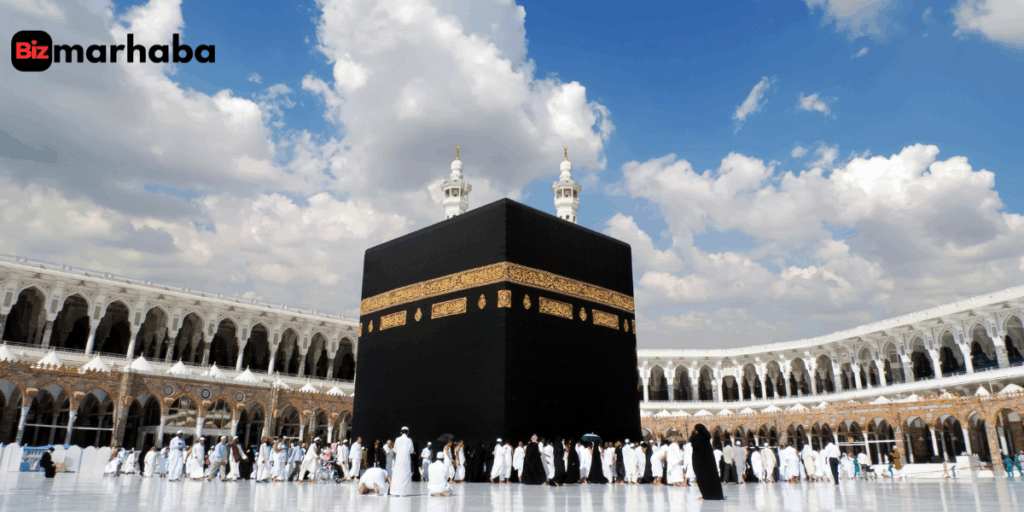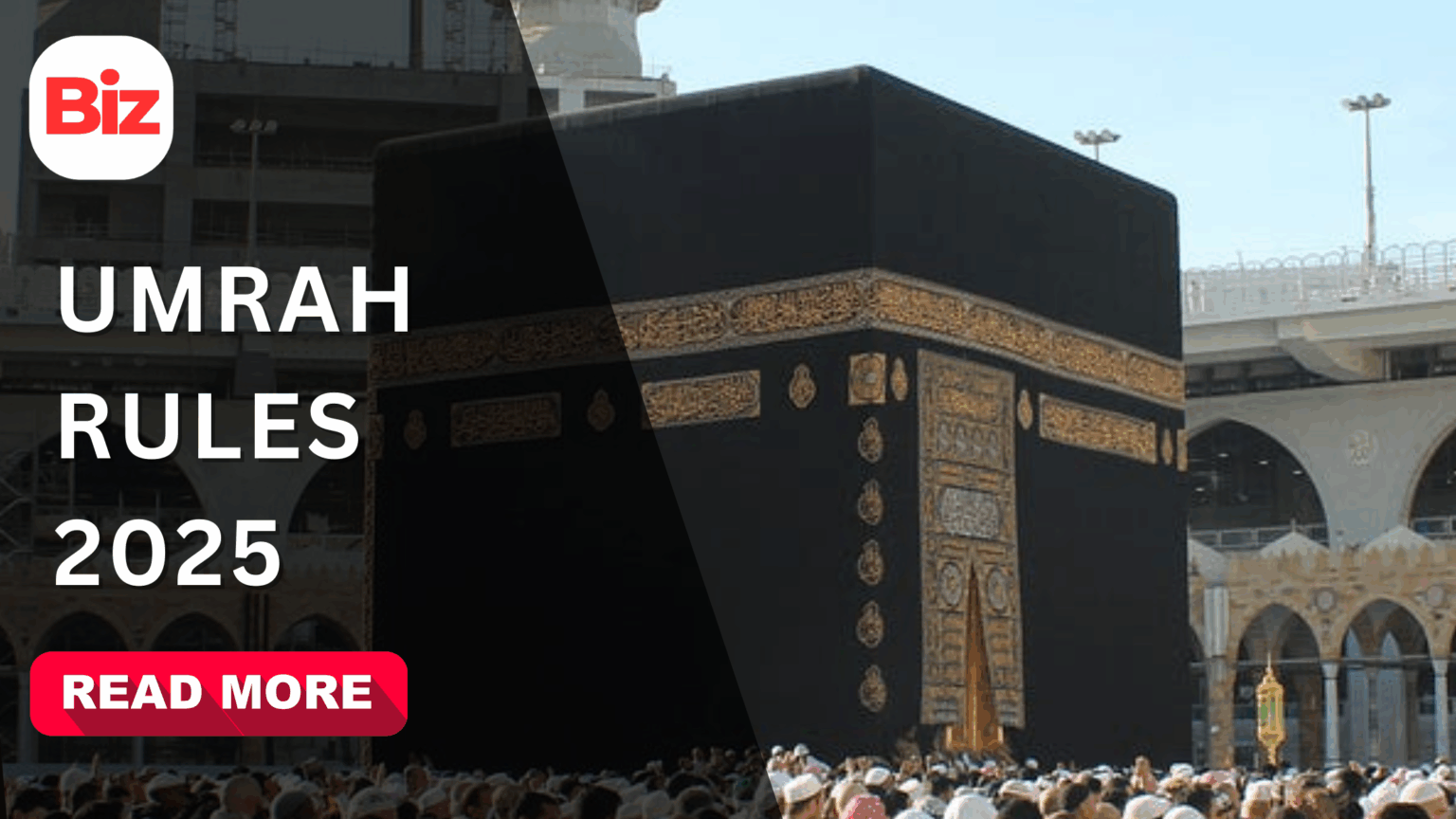The landscape for pilgrims heading to Mecca and Medina has shifted dramatically. The Umrah rules that applied just a year ago no longer guarantee a smooth journey or even entry. Saudi Arabia has tightened its visa, lodging, transport, and compliance requirements so firmly that some warnings say: Don’t attempt Umrah on a tourist visa.

Here are the 10 key changes you must know now, before you commit to dates or spend money.
1. No Umrah on Tourist Visa — Strict Ban in Effect
This is the change making headlines: travelers can no longer perform Umrah on a standard tourist visa. The new system demands a dedicated Umrah visa or permit via official platforms. Those attempting to go with tourist status risk being stopped or rejected, especially at Madinah’s Riyaz ul Jannah or other holy zones.
In short, the era when you could slip in on a tourist visa and convert to Umrah is over.
2. Hotel Booking on Nusuk or Masar Now Mandatory
You must book your accommodation before you even apply for the visa. Saudi now mandates that lodging be documented in the Nusuk Masar platform (or linked system). Only licensed hotels qualify.
You can’t wait until you land to secure a place.
3. Staying with Relatives Is Strictly Controlled
If you intend to stay with family or friends instead of a hotel, those hosts’ Saudi ID numbers must be provided and linked to your visa application. Changes or postponements get reflected in the system.
The idea: your stay cannot be off-the-books anymore.
4. Complete Itinerary Submission Now Mandatory
You’ll submit your full travel itinerary (dates, hotels, transport) with the visa application. Once approved, it’s immutable. If you extend or deviate, you face fines or outright rejection.
No more last-minute improvising.
5. Transport Must Be Pre-Booked with Approved Provider
Your visa will demand that all your internal transport: airport transfers, shuttles, and local taxis be prearranged. Only Nusuk-approved vehicles or Haramain Express train tickets are accepted.
You can’t just hail random taxis from Jeddah airport.
6. Stricter Airport and Arrival Inspections
On arrival, your hotel reservation and transport booking will be verified. If they’re missing or don’t align with the system, you could be fined or refused passage.
No more passing through unchecked gates.
7. Year-Round Access Granted to GCC Citizens and Residents
For GCC nationals, including those in the UAE, there is slightly more flexibility. Residents can now apply throughout the year, but still must use the Nusuk permit system.
For example, getting an Umrah visa for UAE residents now means following the same strict hotel and transport booking requirements as everyone else.
8. Seasonal Deadlines & Visa Windows
Visa issuance restarted on June 10, 2025, after the Hajj season, and ends by the first of Shawwal. Pilgrims must enter by the 15th of Shawwal and exit by the first of Dhul Qi’dah.
Miss those dates and you’re out of luck.
9. Tighter Regulations on External Umrah Agents
Saudi authorities will no longer accept new applications from unvetted agents. Agreements with Umrah operators must be made and registered before deadlines every year.
Your agent must already be in the system.
10. Severe Penalties and Risk of Future Entry Bans
Violating any rule, changing itinerary, using unlicensed transport, or overstaying can prompt hefty fines, blocking of your permit account, or even future bans.
The challenge is not just in following them, but understanding how unforgiving the system now is.
What This Means for UAE Residents & GCC Pilgrims
If you’re a UAE resident (or GCC resident), you can still access Umrah under the new system, but only via compliant packages: lodging, transport, and visa all tied together via the Nusuk platform.
You lose the advantage of flexibility that many had before. And yes, “umrah visa rules” also consolidate under the same regime now.
Careful Planning and Verification Are Your Only Safeguards
It’s not enough to just want to go for Umrah anymore. You must prove you have the infrastructure: hotels, transport, a valid agent, and commitments. Even in cases where the tourist visa could once have sufficed, that loophole is effectively closed.
If you don’t comply, you might be turned back in Jeddah before ever reaching Mecca.
Pilgrims’ Reactions and the Bigger Picture
Reactions from pilgrims worldwide have been mixed. Some welcome the stricter framework, saying it prevents exploitation by unlicensed agents and ensures a more comfortable journey. Others, however, feel the sudden shift has stripped away the flexibility that made Umrah more accessible, especially for those traveling from nearby countries. The bigger picture is clear: Saudi Arabia wants to streamline pilgrimages, reduce overcrowding, and align the process with Vision 2030 goals of digitization and better visitor management.
Frequently Asked Questions (FAQ)
Q: What exactly do the new Umrah Rules mean for me?
A: They demand you prebook your hotel and transport, lock your itinerary, use a dedicated Umrah permit (not tourist visa), and stick precisely to the plan.
Q: Can I still use a tourist visa to perform Umrah?
A: No. New regulations block most from doing Umrah using a tourist visa. You need the official Umrah permit system.
Q: What are the updated umrah visa rules?
A: They require verified accommodation, licensed transit, sealed itinerary, and agent registration under the Nusuk / Masar framework.
Q: Do UAE residents have any advantage under these rules?
A: They may have more access to permit windows and port entries, but are still bound by the same booking, agent, transport limits.
Q: What happens if I break one rule mid-trip?
A: You risk fines, blocking your account, or being stopped from pilgrimage zones. No leniency.
Q: Where can I check the official requirements?
A: Use the Saudi eVisa official portal (ksavisa.sa) and the Nusuk / Masar platforms for updated Umrah visa rules.
YOU MAY ALSO READ:
Saudi Arabia Extends 30-Day Visa Grace Period for Overstayers








